Going to Purchase OTI Bonds? Read These Important Tips

If you’re thinking about starting your own business as a an ocean Freight Forwarder or Non-Vessel Operating Common Carrier (NVOCC) handling cargo shipped in or from the US, you firstly need to learn more about the process. It is necessary for you to purchase OTI Bonds SC in order to operate as a licensed OFF or NVOCC in the United States. These bonds are somewhat similar to other customer bonds such as a continuous import bond.
Being an online business, importing products from all around the world so lead on Amazon either as Amazon fee seller or sell it on your own website. Nothing beat being your boss, right? During the importation process though you will have to deal with customs clearance, now everything you moved around to customs clearances seems to be so mysterious.
For example, continuous import bond if you’ve never done it before. You’d be like, what is a customs bond? Don’t worry, in this post, we’re going to make it crystal clear for you. And you’ll be reading three tips to save you money while purchasing OTI Bonds.
What is a customs bond?
You know you need the HTS code to determine the correct test and duty you’ll have to pay to the US customs. But, the US custom is not going to take the risk and assume that you’re going to pay for it therefore the customs bond is required to be established as an insurance to guarantee that you’ll pay your taxes and duties.
If you’re importing for commercial purpose and your declared value is greater than $2,500, you’re required to acquire either a continuous import bond or single entry bond depending on how many times you’re going to import in the next twelve months.
What is an OTI Bond?
The difference between other bonds and OTI bonds is simple. A normal customs bond is a kind of a financial agreement between three parties – the importer, Surety Company, and customs agency (CBP). An OTI bond guarantees completing all contracts with shippers and carriers without any harm to shipping merchandize.
Important tips to avoid risks and save money
- Know your eligibility: It is vital that you know the eligibility requirements for obtaining an OTI license. You must have at least three years of experience as an OTI to be qualified for this. Your must be gained this experience while being in the US.
- Wait: Wait until you have met the eligibility criteria. It’s better to avoid filling FMC-18 application form if you know you’re not a qualified individual.
- Shop: A lot of people buy custom bond from their freight forwarder which is fine but you should shop your customs bond from different customs broker or you can purchase it through online surety companies that give significant discounts.
- Compare rates: Customs bonds rates vary depending on various factors such as total value of your cargo and from where you’re importing goods. You should compare rates of different companies to see who is giving the best cost.
Helping Freight Forwarders and NVOCCs in Obtaining OTI Bonds
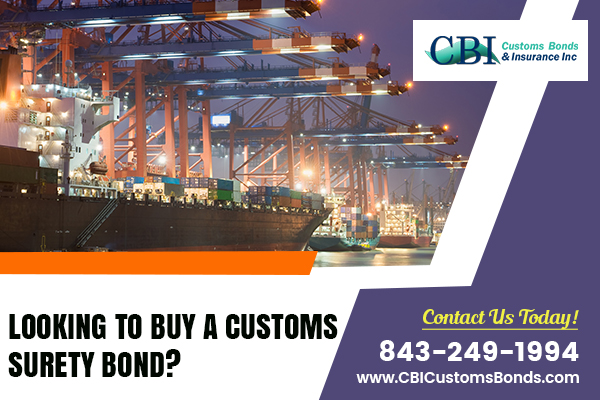
When it comes to selling goods overseas or purchasing goods from an international supplier - you want to ensure you are choosing a freight company that will provide you with a reliable and dependable freight forwarding service. The process of importing and exporting foreign goods can be complex here in the US if you take it lightly and avoid expert assistance. To operate as OFF and NVOCCs successfully, it is mandatory for you to obtain proper OTI Bonds NY which is also part of the licensing procedure.
CBI Customs Bonds & Insurance Inc strives to provide the best bond and insurance solutions to importers, exporters, ocean carriers, brokers, warehouses, and freight forwarders. Our insurance professionals have been in business since 1981 which enables us to cater to the unique needs of our clients.
We have been successfully delivering services related to customs surety bond for many years now. You may always count on our seasoned agents for purchasing OTI Bonds, Continuous Bond, Importer Security Filling or Single Entry Bonds.
Becoming a competent freight forwarder and non-vessel operating common carrier with steady growth and operations might be difficult nowadays as more franchise-based companies entering this pool. It’s quite hard to get enough business from this niche and competing with other esteemed companies can be full of investments and efforts.
How to set-up an NVOCC in the U.S.? You need to acquire a license for your company. It is a special license issued and approved by the Federal Maritime Commission or the FMC. That license is known as the Ocean Transportation Intermediary license. The Bureau of Certification and Licensing administers the Ocean Intermediary License. The Bureau of Certification and Licensing is an area of the Federal Maritime Commission. A company can obtain an Ocean Transportation Intermediary License first by applying for it and then pass through a series of steps.
These steps entail obtaining necessary OTI Bonds and proving at three years of experience. You may contact us to know more about FMC-18 form and other requirements. An NVOCC is liable for shipping issues and acts as a carrier. This is the difference between a freight forwarder and an NVOCC.
If you have been looking for a reliable surety company or customs broker for any type of customs surety bond, you can contact us today. We provide both continuous bonds and single entry bonds at the best rates in the market.
What Should You Know About Continuous Customs Bond?
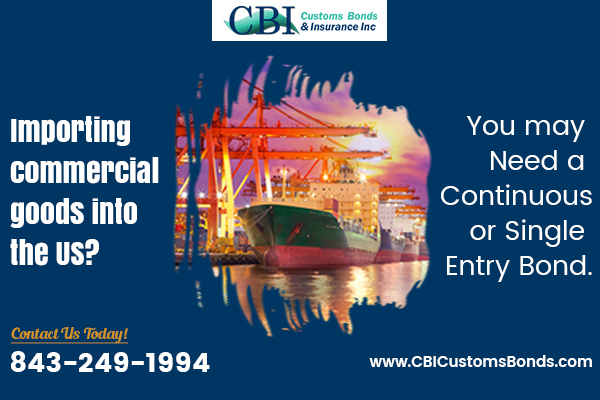
Every week a new trading turn-around shapes the country’s economy. It’s probably the toughest occupation when you’re a part of the news broadcasting website or a media channel that publishes stats related to supply chain and international trading. It’s obviously beyond the understanding of a common importer. The importing surveys, reports, and cryptography may seem abstracted and baffling if you’re not one of the frequent importers. Similarly, a continuous customs bond may seem to a lot of work when you’re not familiar with it.
However, if you’re one of the people who are frequently involve in shipping large cargos, tracking logistics, and clearing a large number of imports through customs, this isn’t going to be typical for you. It’s true that dealing with the officers of the Customs and Border Protection (CBP) is a tricky task.
You may access detailed information about different types of customs bonds CA from the official website of CBP, here are some important things you should know about a continuous customs bond:
They are different from single entry bonds
A customs bond is a type of guarantee for taxes, fines, and duties required by the CBP from importers. The bond gives a kind of permission for a commercial transaction of goods that are in excess of $2,500. There are two types bond – Continuous Bond and Single Entry Bond. A continuous bond is valid for multiple imports during a period of year while single entry bond is only valid for one-time transaction during a period of 12-months.
Costs
The bond amount may vary as per the total value of merchandize to be imported. The final bond amount is always determined by the agents of CBP. A single entry bond is equal to total value of goods plus the associated duties, taxes, and other fees. However, the minimum amount for a continuous customs bond is typically $50,000 or 10% of the total duties and taxes the importer delivered in the past 12 months.
When do you require a customs bond?
Customs bonds are required for any importing goods that exceed the value of $2,500 into the US. So if you’re planning to o receives products for commercial purpose from a foreign country, you may require obtaining an appropriate bond to stay compliant with rules and regulations set by the different federal agencies like CBP and FDA.
How to obtain one
You may obtain the necessary customs bond through licensed customs brokers, freight forwarders or surety companies. They can guide through the application process and documents you would need for it. For further information on continuous bonds, you may contact a surety company/broker.
Why Do Importers Need To Purchase Customs Surety Bond?
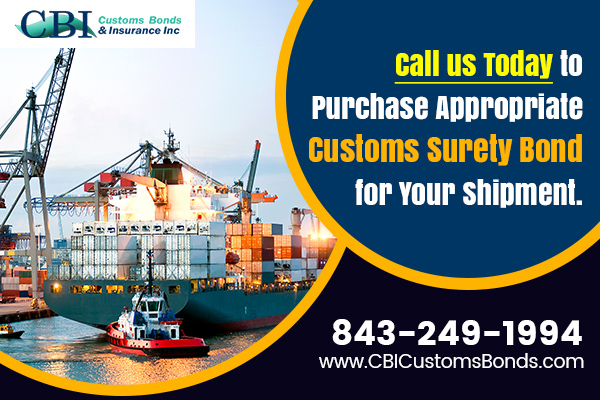
The institution of importing is one merchandize which is drenched in tradition is important. Over the years as it has been celebrated by different processes and through different era’s a whole range of conventions and customs surety bond have arisen. Not least, the importing and exporting of the foreign goods. Customs law solicitors are highly sensitive to the personal issues involved, so they begin by recommending you qualified professional mediators to try to solve the problem this way. Security is important as it represents the heart of any transaction, where every individual involves for profit.
Customs bonds are not alike other bonds. They act much like agreements between people. A customs surety bond is an agreement between three parties – the importer (principal), the obligee (insurance agency), and customs (CBP). It ensures CBP all necessary duties, taxes, and fees will paid timely for the requested commercial import.
You should know that only licensed freight forwarders an act as legal intermediary. For example, freight forwarders and non-vessel operating common carriers (NVOCCs) who have obtained required OTI Bonds can operate as intermediary for an ocean transaction in the US.
A customs bond sometimes also referred to as an import bond that is required when an importer tend to import goods valued at over $2,500. All commercial imports intended to be shipped in the United States must be covered by necessary bonds and follow rules and regulations.
If you’re planning to import something that falls under observation of other federal agencies such as food or animals that come under administration of FDA, you may require obtaining an additional customs surety bond. The bond amount is usually three times the value of merchandise you’re supposed to import. It’s better to work with licensed customs brokers in order to complete the documents and application properly.
Calculating OTI Bonds CA is not an easy task because it entails a lot of factors such as total amount of duties and taxes associated with the importing merchandize. It is common with customs bonds that they must be at least 10 percent of the total duties and taxes at a minimum of $50,000. You are advised to consult with expert insurers or brokers to know the right process of acquiring a customs bond.
Understanding 4 Types of Customs Surety Bond
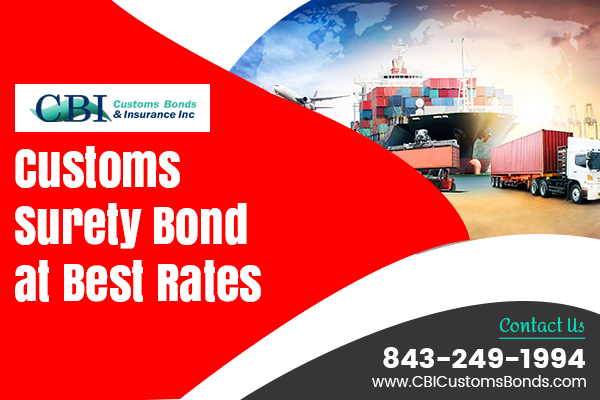
A special constitutional section enables congress to impose and collect taxes, fines, duties and other excises. Whether you purchase electronics from foreign countries, food or any other product, these goods are always subject to customs duties. A customs surety bond is a type of agreement between three parties:
- Principal: an importer or business who is required to abide with certain federal obligations
- Obligee: a party to whom these obligations are owed (i.e. CBP)
- Surety Company/Broker: a party that is responsible to pay compensation to CBP if the Principal fails to adhere obligations
There are several types of bonds that you may have heard of before. You may have signed a contract or medicare bond previously. But, customs bond is a quite different document. A surety bond is fairly like a safety arrangement. The principal pays a charge, called a premium, to the surety. Getting a customs surety bond gives an extra impetus to the obligee to confide in the principal. In case of default, the surety pays the punitive entirety to the obligee (the Customs and Border Protection), and afterward looks for repayment from the principal.
Here are 4 different types of surety bonds:
Customs Activity Code 1: the US activity code 1 importer bond is the most common type of bond agreement mainly concerned with commercial importers of the US. Every importing products into the U.S. for commercial reasons, or that transports or carries imported goods through the U.S., must have a customs bond in place. There are two main types of customs bonds in this category: Continuous Transaction Bonds and Single Transaction Bonds.
Activity Code 2 Bond: also called custodian of bonded merchandise bond, is another popular type of bond that customs broker writes specifically for warehouse owners, container stations, carriers, and cartmen. These bonds are to cover custodians and the minimum bond amount for them is $50,000. This type of customs bond ensures custodians the security for the damage occurs to the imported cargo for while it is under their possession.
Activity Code 3: also referred to as International Carrier Bond (C3) is required by CBP Area Port Director(s). This bond is for operators who transport goods and passengers through waters to ensure timely payment of any overtime duties and fines to customs officials. The minimum amount for this bond is $25,000 and can go up to $250,000 depending on the type of shipment coming from the location outside of the US.
Airport Security Bonds: it is similar to a importer customs bond required by the U.S. customs to ensure compliance with rules and regulations while accessing the federal inspection services areas.
Understanding the all types of bonds isn’t something foolproof and you have to invest a lot of time to know all the aspects. It is always better to work with a licensed surety company to obtain any kind of customs bonds.
Significance of 301 Customs Bonds in Importing into the US
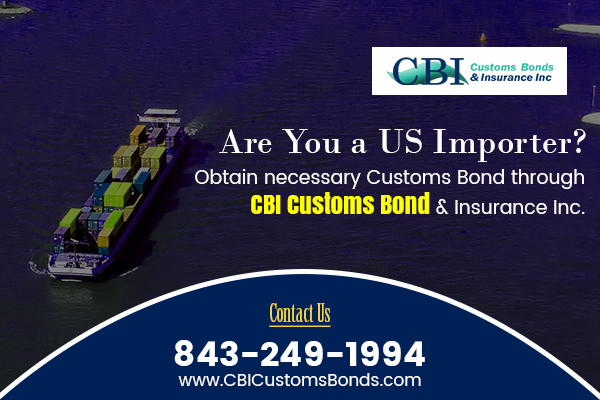
The import market is relatively larger for the United States that is home to a population of about 330 million people. As per the Bureau of Economic Analysis, the country imports around $2.88 trillion or almost 16.5% of its GDP. These imports vary from high-tech equipment, industrial machinery to petroleum products and software technologies. So it’s evident that import market is enormous here in the US and you can find a place in it for your goods as well. But, before you consider importing for your business purpose, you should learn the importance of customs bonds CA in the process.
The U.S. Customs and Border Protection (CBP) is one of the largest federal agencies and primary border control organization that oversees all the import and export functions. It has the ultimate authority to seize or forfeit all goods that are smuggled, stolen, or surreptitiously imported. A 301 customs bond or surety bond is a type of insurance coverage that intends to protect the U.S. Treasury from any deceitful practices by the importer.
It helps the CBP to recuperate all taxes, fees, duties, and/or fines that importer fails to pay. Customs bonds act as a financial agreement that guarantees all the payments due on the importer.
A lot of factors play a role in the import process. As you know the industry is staggeringly larger, every day thousands of companies involved in importing merchandise from over 150 countries around the world. This makes it compulsory for the United States Department of Security to facilitate international trade smoothly and protect the land from any contraband.
As per the CBP, the primary purpose of the 301 customs bond is “to protect the U.S. treasury and ensure compliance of any pertinent laws, regulations, and instructions by the importers.”
A customs bond can be obtained through a customs broker/insurance company or by directly applying to the official website of the CBP. It is better to hire a experts of customs to acquire right bond that suits your business requirements.
At USA Customs Clearance, there is always a customs bond requirement regardless of your shipment value. The customs bonds CA and Insurance Inc makes it easy and affordable to obtain the right bond you need and makes the purchase process pleasant for its client.
Purchase Continuous Import Bonds at the best rates

Anytime you import goods into the United States there are tones of documents and steps you need to take to ensure that your goods can clear customs and arrive safely on their US final destination. One of these required steps is Customs Bonds.
A customs bond is required anytime you’re importing goods to the US from a foreign country that has commercial value in excess of $2500. But they are also required for any items that fall under federal regulations which could include items like firearms, explosives, hazardous materials, animals, and certain types of foods and plants. A continuous import bond is a type of bond that you can bring for multiple entries.
Customs Bonds
A continuous customs bond essentially serves as a contract or agreement between three parties – the importer, customs, and insurance company/broker. The purpose of the bond is to ensure a set of specific obligations are met by the importer such as payment of duties, taxes, and other charges. There are two most common types of customs bond – Single Entry and Continuous Import Bond.
A single entry bond is exactly what it sounds like. It only grants an import customs clearance in compliance for one shipment. For any shipment after your bond coverage, you need to obtain an additional customs bond. These are generally better for businesses that import to the US on a rather infrequent basis since the costs of the bond were out of quickly if you’re frequently importing merchandise into the country.
A continuous customs bond grants you permission to import for a full year after its date of purchase and grants importer access to import to the US any number of times they wish within that period. These are generally a much better option for companies that import goods on a frequent basis. It saves them a significant amount of money than re-purchasing a single entry bond for each shipment.
Purchase Continuous Import Bond
Looking for a reliable insurance agency that deals in customs bond? Look no further than CBI Customs & Insurance Incorporation that has been providing trade-related services since 1981. We carry extensive experience in customs brokerage and international freight forwarding operations. We provide continuous import bonds at the most competitive rates in the market.